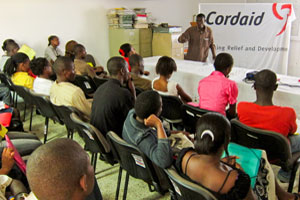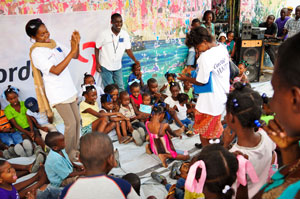
CORDAID mental health capacity building session.
Credits: Worms/Caritas
Some were trapped in rubble for hours. Other lost loved ones. Thousands saw their homes destroyed. For survivors of Haiti’s 2010 earthquake, grief and pain became constant companions. As Caritas raced to get families water, food, and shelter, its aid workers realized that mental health care was just as great a need.
“More than a year after the January 2010 earthquake, many Haitians still found it hard to enter buildings,” says Boris Budosan, Mental Health Advisor for Cordaid (Caritas Netherlands). In some cases, experiencing the terrifying earthquake led to more serious conditions such as severe depression and even psychoses. Stress and anxiety were widespread, sometimes leading to violence and drug or alcohol problems.
In Haiti, there is little specialized care available to help people vulnerable to mental health problems. Cordaid, which has worked in Haiti for years, stepped into the gap. It developed programmes that help both children and adults cope with the earthquake’s psychological aftershocks and improve the survivors’ emotional wellbeing.
Cordaid brought in psychiatrists, psychologists and social workers to train hundreds of community-level workers, along with primary healthcare staff, in how to help people in distress. It also worked to establish a referral system between targeted communities and primary healthcare systems. It held community mobilization and awareness-raising sessions so survivors would know the signs of severe anxiety and depression–and know where to go for help.

Cordaid’s community level workers in action
Credit:Worms/Caritas
Cordaid organized community events where survivors could relax, play sports, do crafts, and enjoy music. In camps for displaced people, Cordaid set up football tournaments and other stress-relieving activities. “For the displaced, living conditions in the camps are often extremely difficult,” says Budosan. During the events, camp residents could take a break from struggling for daily necessities and focus on something fun.
By November 2011, more than 95,000 people had participated in programmes to heal trauma and reduce stress. . “For survivors facing cumulative stress, we hope to stop a ‘second wave’ of psychiatric problems ,” says Budosan. “We want people to regain and strengthen their resilience.”
